WORK / LIVE 干活 Palermo
MANIFESTA 12, Politics of Dissonance
KARAOKE PROPAGANDA
Social Sensibility R&D Departments Beijing & Paris/Gonesse
MANIFESTA 12 Politics of dissonance
The Social Sensibility R&D Departments of Bernard Controls' factory plants in Beijing and Paris/Gonesse have been invited to co-curate, together with Mike Watson, Quartair and Artists at Risk, a section of Politics of Dissonance, a performative/sound art/spoken word and VJ official collateral event of Manifesta12, in Palermo, in a space in Vicolo del pallone, in the Kalsa area of the city. The proposal we submitted was called KARAOKE PROPAGANDA, a performative group action in flow including different activities carried on all along a whole day. We started off with distributing posters of the event all around the nearby areas of the city, along the harbor, and inside the small streets, using public and private walls and interacting with the local small businesses and passersby. We continued with a parallel activity of water calligraphy (inspired by the one practiced in Chinese public parks) on the seaside boardwalk, using brooms and buckets. Then we played games in the public gardens before heading back to the space continuing to attach the posters in different venues. One in the final venue we engaged in a big characters wall writings in Chinese, French, English and Italian until the sunset. At this point the VJ, the live music by Fenni and the Karaoke and open microphone sessions started and went on till late. Here I display the original proposal we submitted to the Manifesta 12 curatorial committee: "Karaoke Propaganda" This project is an extension of the practice to collect people’s voices through interviews, conversations, wall writing, digital exchanges and written documents along the 8 years of activity of the Social Sensibility R&D Department in the Bernard Controls factories in Beijing and of the 4 years in Paris/Gonesse. Working with people from different countries, different cultures and socio-political background, we used art as a tool and a language to allow people to investigate differently something they wanted to and to establish a different dialogue with themselves and with the others within and without their working environment. We wanted to give them a voice and an enhanced sense of dignity that comes with it and we knew that this would not be something simply ‘easy’, ‘good’ or ‘meaningful’. We witnessed how giving voices to people in a real situation, means bringing up the contradictions, the differences, the barriers and the limits that human relationships have to face every day in the complexity of today’s working and private life. If hierarchy and power-relationships might appear as the direct targets of this practice, evidence has proved that peer pressure and cultural and identity context can often become the more complex and difficult levels on which a socially engaged project operates. What we understood is that by allowing a creative space to everyone who is interested to grab it, we create the potentiality for a shifting in how this person will be perceived by the others after he/she has chosen art language to say something in public. Yet we cannot control what that shift can be and what it would change in the relationship between the individual who expresses him/herself creatively and the communities he/she is part of : working community, family, friends, acquaintances. Sometimes after this first creative individual shift, all the relationships this person has with the rest of the world also shifts and this breaks the previous equilibrium and demands for new dynamic balances to be found. It is not a process without consequences, it does not go in a way that ‘can be planned’ but, because of this, it is an interesting way to address social imagination without relying on strict methodologies and/or planned traditional or dogmatic education, therapy or doctrine. To accept the potential and the danger of an encounter that is not necessary means to never spoil what it can come out of it. It means avoiding to collapse all this potentiality into fact before it happens and even afterwards. If these words bear a sense of serious engagement and claim some sort of mission, this is not intended with the severity of an ideology or with the detachment of a professional expertise; it is intended as a commitment to the time we spend with other people to exchange and understand them and to try and inquiry about what still makes sense and how can we spot it and pursue it within the spectrum of a shared experience and of a knowledge exchange. What does it mean to have voice today? Who gives a voice to whom? Where can people use their voice without being previously briefed about what to say or manipulated into saying what somebody else wants them to say? How can a voice be perceived among the cacophony of the mediatic entertainment or heard from behind the impenetrable curtain of a severe censorship? And again, who should we be speaking to ? With which words? In which languages? To say what? Along the years we have collected sentences that people dropped during conversations about art, work, life, politics, private life in very informal contexts and situations, from a pause to a lunch break, to a private interview, an artistic presentation or a working meeting. These sentences have remained with us: they became hand written words on the stairway of a museum, tagged fonts on the wall of another one, and a sound art piece broadcasted through improvised cardboard speakers in a third one. To re-invent them through a karaoke project for a sound festival such as Politics of dissonance is just an organic sequel of the opportunities we have encountered to propose our project. Karaoke is one of the most popular forms of mainstream entertainment in which both people from the East and from the West indulge just to shut their brains off and/or share some cheap but warm empathy in a silly and safe way. Mainstream medias are also co-opting it recently and turn it into a trendy option. But if we look at the device itself and at its context, what if karaoke could be a place where one could ---caught by a glimpse of witty madness--- also chose to ‘not follow’ the lyrics, to not sing the lines and the chorus and instead say something he/she wants to say, or quoting a poem, reading a passage of literature, singing another serenade or an ancestral song, recite a political slogan, remember someone who is not there anymore, say a prayer, tell a story, send a message, a spell, an enchantment or a course.. In today’s polarized world we witness a chaotic scenario in which democracy is slowly eroded and emptied of its emancipatory and egalitarian power in the West while the model of the technocratic authoritarian state well represented by China start teasing and appealing because of its efficiency and capacity to deal with large scale issues and big numbers. Censorship functions very well in both models: either information is totally filtered and controlled for the masses, either the masses are flooded in a continuous stream of information where it is impossible to seize what is relevant and meaningful. In both cases the kingdom of spectacle is reaching its zenith: the traditional symbolic and brainwashing ideology of dictatorship and the perverse banality of the neo-liberal populist kitsch multiply themselves in many ways and indulge in a previously unforeseen intercourse which breeds an imaginable variety of monsters, like those evocated by Gramsci’s words, in that moment in which “…the old dies and the new struggles to be born” We don’t know how to take on these monsters as individuals and we don’t think there is a common strategy to engage with them. What art means for us, is that, no matter what the future will bring, we are still capable to imagine something else until the very end. As a band of travellers who met by chance, we still don’t really know why we are together apart from the fact that we are still curious about ourselves and about the others and we agree about the idea of a society and a world where there is still room for the many and not just for the few. Our karaoke in Palermo, as part of Politics of Dissonance, under the umbrella of Manifesta, reminds us a bit of Pirandello’s unfinished myth “The Giants of the mountain” . We have come from far away, as outsiders, hosted by another bunch of outsiders in a charming haunted villa, to stage a play which is both a private and a collective storytelling. Luckily the content of our contribution has not been commissioned. We can hear the noise of the boots of the giants walking down the mountain and we will perform for them and against them at the same time, and we will perform for everyone else too, those who have not been invited but are nevertheless around and welcomed. Like the inhabitants of Pirandello’s ‘Villa degli Scalognati’, we are still not indifferent to the idea that if we can cook some weird magic perhaps something can happen: so we will put together live and recorded séances with Chinese traditional poems and old revolutionary songs, enchantments from Togo’s legends, storytelling from Mali, Creole spells, Italian and French poetry, computer language, literature, pop songs, lullabies, spoken word and whatever else comes at hand. We will welcome and encourage spontaneous participation among those in the public who feel like joining our karaoke propaganda. You are welcome to follow our activities which will start at 10:30am with a poster distribution around the city, continue in the afternoon with a Chinese-park inspired water calligraphy action in the streets and will become our karaoke propaganda starting at 6:30pm until 02:00am. The music scores will be 4 different ones, composed by FENNI, with interacts of 20 minutes between each other and live improvised parts. The performers will intervene both on the scores and in the interacts according to a schedule which cannot be fully confirmed as it will respond to the very moment. Thank You for your kind understanding. The Social Sensibility r&d Department in Palermo is represented by: Fenni, Wu Shuqing, Zhao Tao, Antoine Agudze, Sounkarou Dembele’, Blandine de la Taille, Tianji Zhao, Alessandro Rolandi and Christine Bernard. Everyone else involved is credited in the video documentary recently published on youtube whose link is available at the beginning of this page. Once it was selected by the Manifesta12 committee, the whole project has been made possible by the continued and generous support of the direction and of all the employees of Bernard Controls in China and in France
干活巴勒莫
宣言 12,不和谐的政治
卡拉OK宣传
社会敏感性研发部门北京和巴黎/Gonesse
MANIFESTA 12 Politics of dissonance
Bernard Controls 北京和巴黎/Gonesse 工厂的社会敏感性研发部门受邀与迈克·沃森、Quartair 和风险艺术家一起共同策划了一个不和谐的政治部分,一个表演/声音艺术/口语Manifesta12 的文字和 VJ 官方附带活动,在巴勒莫,在城市 Kalsa 地区的 Vicolo del pallone 的一个空间中。我们提交的提案被称为 KARAOKE PROPAGANDA,这是一个流程中的表演性团体行动,包括一整天进行的不同活动。我们首先在城市附近地区、港口沿线和小街道内分发活动海报,使用公共和私人墙壁,并与当地小企业和路人互动。我们继续在海边的木板路上用扫帚和水桶进行了一项平行的水书法活动(灵感来自中国公园里练习的书法)。然后我们在公共花园里玩游戏,然后回到空间继续在不同的场地贴海报。在最后一个场地,我们在大字墙上用中文、法文、英文和意大利文写着,直到日落。此时,VJ、Fenni 的现场音乐和卡拉 OK 以及开放式麦克风会议开始并持续到很晚。这里展示我们提交给Manifesta 12策展委员会的原始提案:“卡拉OK宣传” 这个项目是8年活动中通过采访、对话、墙写、数字交流和书面文件收集人们声音的实践的延伸Bernard Controls 北京工厂的社会敏感性研发部门和巴黎/Gonesse 的 4 年。与来自不同国家、不同文化和社会政治背景的人们合作,我们将艺术作为一种工具和一种语言,让人们能够以不同的方式调查他们想要的事物,并与他们自己以及与他们内外的其他人建立不同的对话。工作环境。我们想给他们一个声音和随之而来的增强的尊严感,我们知道这不会是简单的“容易”、“好”或“有意义”的事情。我们见证了如何在真实情况下为人们发声,意味着在当今复杂的工作和私人生活中,提出人际关系每天必须面对的矛盾、差异、障碍和限制。如果等级制度和权力关系可能成为这种做法的直接目标,证据已经证明,同伴压力以及文化和身份背景往往会成为社会参与项目运作的更复杂和更困难的层面。我们的理解是,通过让每个有兴趣的人都拥有一个创造性的空间,我们创造了一个可能性,在他/她选择了艺术语言在公共场合说些什么之后,其他人将如何看待这个人。然而,我们无法控制这种转变会是什么,以及它会在创造性地表达自己的个人与他/她所在的社区之间的关系中发生什么变化:工作社区、家人、朋友、熟人。有时,在第一次创造性的个人转变之后,这个人与世界其他地方的所有关系也会发生变化,这打破了之前的平衡,需要找到新的动态平衡。这不是一个没有后果的过程,它不会以“可以计划”的方式进行,但正因如此,这是一种有趣的方式来解决社会想象,而无需依赖严格的方法论和/或有计划的传统或教条教育,疗法或教义。接受不必要的相遇的潜力和危险意味着永远不要破坏它可以从中产生的东西。这意味着避免在所有这些潜力发生之前甚至之后将其分解为事实。如果这些话带有严肃的投入感和使命感,这不是意识形态的严重性,也不是专业知识的超脱;它旨在承诺我们花时间与其他人交流和理解他们,并尝试探究什么仍然有意义,以及我们如何在共享经验和知识交流的范围内发现并追求它.今天有发言权是什么意思?谁给谁发声?人们可以在哪里使用他们的声音,而无需事先被告知要说什么或被操纵说出别人想让他们说的话?怎样才能在媒体娱乐的嘈杂声中听到声音,或者从严密审查制度的坚不可摧的帷幕后面听到声音?再一次,我们应该是谁
WORK / LIVE 干活 Palermo
MANIFESTA 12, POLITICS OF DISSONANCE
KARAOKE PROPAGANDA, 2018
Social Sensibility R&D Departments Pekin & Paris/Gonesse
MANIFESTA 12 Politics of dissonance
Antoine Agudze, Sounkarou Dembélé, Hamid Zeggane, Wu Shuqin, Fenni, Zhao Tao, Alessandro Rolandi, Tianji Zhao, Blandine de La Taille.
Ce projet a été réalisé via la plateforme curatoriale Politics of dissonance dirigée par Mike Watson, et présenté à la biennale Manifesta 12 à Palerme en juillet 2018.
Karaoké propaganda fut la première occasion d’une rencontre artistique et physique des deux départements Social Sensibility R&D Pékin Daxing et Paris Gonesse. La journée d’action a débuté par une campagne d’affichage sauvage dans la ville de Palerme. Puis le programme s’est poursuivi par une séance de graffiti et calligraphie sur les murs de l’espace d’exposition pour s’achever sur plusieurs performances de Karaoké.
Travaillant avec des personnes venant de pays, cultures et contextes sociopolitiques très différents nous avons utilisé l’art comme langage commun afin de permettre à chacun de formuler un nouveau dialogue avec lui-même et son environnement dans ou hors du cadre professionnel.
Donner la parole à des personnes en situation réelle signifie parler des contradictions, des barrières visibles et invisibles qui affectent et façonnent les rapports humains dans la vie comme au travail.
Que signifie avoir la parole aujourd’hui ? Qui donne la parole à qui ? Comment une voix peut-elle résonner dans la cacophonie du divertissement médiatique ? Comment une parole peut-elle être perçue derrière le rideau d’une censure sévère ?
Encore une fois à qui devrions nous parler ? Avec quels mots et pour dire quoi ?
Le karaoké est l’une des formes les plus populaires de divertissement à laquelle participe en Orient comme en Occident un public désireux de se déconnecter dans une ambiance chaleureuse et bienveillante.
Pourtant en examinant le dispositif et son contexte pourquoi le karaoké ne serait-il pas le lieu où l’on pourrait sur un coup de tête choisir de ne pas suivre les paroles ? De ne plus chanter le refrain mais plutôt de dire ce que l’on a envie de dire ? De réciter un poème, une chanson archaïque, un slogan politique, une prière, envoyer un message, lancer un sort ?
Des performances en direct et enregistrées composées de poèmes traditionnelles et vieilles chansons révolutionnaires de Chine, de légendes togolaises, de proses en khassonké ou kabyle, de littérature italienne, de berceuses…
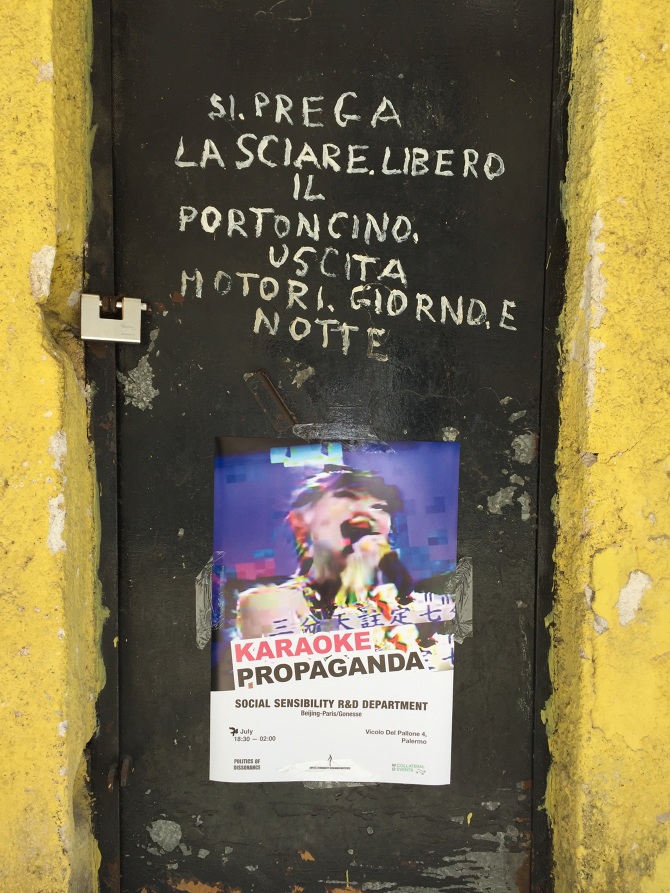
WORK / LIVE 干活 Palermo
MANIFESTA 12, Politics of Dissonance
KARAOKE PROPAGANDA
Social Sensibility R&D Departments Beijing & Paris/Gonesse
MANIFESTA 12 Politics of dissonance
The Social Sensibility R&D Departments of Bernard Controls' factory plants in Beijing and Paris/Gonesse have been invited to co-curate, together with Mike Watson, Quartair and Artists at Risk, a section of Politics of Dissonance, a performative/sound art/spoken word and VJ official collateral event of Manifesta12, in Palermo, in a space in Vicolo del pallone, in the Kalsa area of the city. The proposal we submitted was called KARAOKE PROPAGANDA, a performative group action in flow including different activities carried on all along a whole day. We started off with distributing posters of the event all around the nearby areas of the city, along the harbor, and inside the small streets, using public and private walls and interacting with the local small businesses and passersby. We continued with a parallel activity of water calligraphy (inspired by the one practiced in Chinese public parks) on the seaside boardwalk, using brooms and buckets. Then we played games in the public gardens before heading back to the space continuing to attach the posters in different venues. One in the final venue we engaged in a big characters wall writings in Chinese, French, English and Italian until the sunset. At this point the VJ, the live music by Fenni and the Karaoke and open microphone sessions started and went on till late. Here I display the original proposal we submitted to the Manifesta 12 curatorial committee: "Karaoke Propaganda" This project is an extension of the practice to collect people’s voices through interviews, conversations, wall writing, digital exchanges and written documents along the 8 years of activity of the Social Sensibility R&D Department in the Bernard Controls factories in Beijing and of the 4 years in Paris/Gonesse. Working with people from different countries, different cultures and socio-political background, we used art as a tool and a language to allow people to investigate differently something they wanted to and to establish a different dialogue with themselves and with the others within and without their working environment. We wanted to give them a voice and an enhanced sense of dignity that comes with it and we knew that this would not be something simply ‘easy’, ‘good’ or ‘meaningful’. We witnessed how giving voices to people in a real situation, means bringing up the contradictions, the differences, the barriers and the limits that human relationships have to face every day in the complexity of today’s working and private life. If hierarchy and power-relationships might appear as the direct targets of this practice, evidence has proved that peer pressure and cultural and identity context can often become the more complex and difficult levels on which a socially engaged project operates. What we understood is that by allowing a creative space to everyone who is interested to grab it, we create the potentiality for a shifting in how this person will be perceived by the others after he/she has chosen art language to say something in public. Yet we cannot control what that shift can be and what it would change in the relationship between the individual who expresses him/herself creatively and the communities he/she is part of : working community, family, friends, acquaintances. Sometimes after this first creative individual shift, all the relationships this person has with the rest of the world also shifts and this breaks the previous equilibrium and demands for new dynamic balances to be found. It is not a process without consequences, it does not go in a way that ‘can be planned’ but, because of this, it is an interesting way to address social imagination without relying on strict methodologies and/or planned traditional or dogmatic education, therapy or doctrine. To accept the potential and the danger of an encounter that is not necessary means to never spoil what it can come out of it. It means avoiding to collapse all this potentiality into fact before it happens and even afterwards. If these words bear a sense of serious engagement and claim some sort of mission, this is not intended with the severity of an ideology or with the detachment of a professional expertise; it is intended as a commitment to the time we spend with other people to exchange and understand them and to try and inquiry about what still makes sense and how can we spot it and pursue it within the spectrum of a shared experience and of a knowledge exchange. What does it mean to have voice today? Who gives a voice to whom? Where can people use their voice without being previously briefed about what to say or manipulated into saying what somebody else wants them to say? How can a voice be perceived among the cacophony of the mediatic entertainment or heard from behind the impenetrable curtain of a severe censorship? And again, who should we be speaking to ? With which words? In which languages? To say what? Along the years we have collected sentences that people dropped during conversations about art, work, life, politics, private life in very informal contexts and situations, from a pause to a lunch break, to a private interview, an artistic presentation or a working meeting. These sentences have remained with us: they became hand written words on the stairway of a museum, tagged fonts on the wall of another one, and a sound art piece broadcasted through improvised cardboard speakers in a third one. To re-invent them through a karaoke project for a sound festival such as Politics of dissonance is just an organic sequel of the opportunities we have encountered to propose our project. Karaoke is one of the most popular forms of mainstream entertainment in which both people from the East and from the West indulge just to shut their brains off and/or share some cheap but warm empathy in a silly and safe way. Mainstream medias are also co-opting it recently and turn it into a trendy option. But if we look at the device itself and at its context, what if karaoke could be a place where one could ---caught by a glimpse of witty madness--- also chose to ‘not follow’ the lyrics, to not sing the lines and the chorus and instead say something he/she wants to say, or quoting a poem, reading a passage of literature, singing another serenade or an ancestral song, recite a political slogan, remember someone who is not there anymore, say a prayer, tell a story, send a message, a spell, an enchantment or a course.. In today’s polarized world we witness a chaotic scenario in which democracy is slowly eroded and emptied of its emancipatory and egalitarian power in the West while the model of the technocratic authoritarian state well represented by China start teasing and appealing because of its efficiency and capacity to deal with large scale issues and big numbers. Censorship functions very well in both models: either information is totally filtered and controlled for the masses, either the masses are flooded in a continuous stream of information where it is impossible to seize what is relevant and meaningful. In both cases the kingdom of spectacle is reaching its zenith: the traditional symbolic and brainwashing ideology of dictatorship and the perverse banality of the neo-liberal populist kitsch multiply themselves in many ways and indulge in a previously unforeseen intercourse which breeds an imaginable variety of monsters, like those evocated by Gramsci’s words, in that moment in which “…the old dies and the new struggles to be born” We don’t know how to take on these monsters as individuals and we don’t think there is a common strategy to engage with them. What art means for us, is that, no matter what the future will bring, we are still capable to imagine something else until the very end. As a band of travellers who met by chance, we still don’t really know why we are together apart from the fact that we are still curious about ourselves and about the others and we agree about the idea of a society and a world where there is still room for the many and not just for the few. Our karaoke in Palermo, as part of Politics of Dissonance, under the umbrella of Manifesta, reminds us a bit of Pirandello’s unfinished myth “The Giants of the mountain” . We have come from far away, as outsiders, hosted by another bunch of outsiders in a charming haunted villa, to stage a play which is both a private and a collective storytelling. Luckily the content of our contribution has not been commissioned. We can hear the noise of the boots of the giants walking down the mountain and we will perform for them and against them at the same time, and we will perform for everyone else too, those who have not been invited but are nevertheless around and welcomed. Like the inhabitants of Pirandello’s ‘Villa degli Scalognati’, we are still not indifferent to the idea that if we can cook some weird magic perhaps something can happen: so we will put together live and recorded séances with Chinese traditional poems and old revolutionary songs, enchantments from Togo’s legends, storytelling from Mali, Creole spells, Italian and French poetry, computer language, literature, pop songs, lullabies, spoken word and whatever else comes at hand. We will welcome and encourage spontaneous participation among those in the public who feel like joining our karaoke propaganda. You are welcome to follow our activities which will start at 10:30am with a poster distribution around the city, continue in the afternoon with a Chinese-park inspired water calligraphy action in the streets and will become our karaoke propaganda starting at 6:30pm until 02:00am. The music scores will be 4 different ones, composed by FENNI, with interacts of 20 minutes between each other and live improvised parts. The performers will intervene both on the scores and in the interacts according to a schedule which cannot be fully confirmed as it will respond to the very moment. Thank You for your kind understanding. The Social Sensibility r&d Department in Palermo is represented by: Fenni, Wu Shuqing, Zhao Tao, Antoine Agudze, Sounkarou Dembele’, Blandine de la Taille, Tianji Zhao, Alessandro Rolandi and Christine Bernard. Everyone else involved is credited in the video documentary recently published on youtube whose link is available at the beginning of this page. Once it was selected by the Manifesta12 committee, the whole project has been made possible by the continued and generous support of the direction and of all the employees of Bernard Controls in China and in France
干活巴勒莫
宣言 12,不和谐的政治
卡拉OK宣传
社会敏感性研发部门北京和巴黎/Gonesse
MANIFESTA 12 Politics of dissonance
Bernard Controls 北京和巴黎/Gonesse 工厂的社会敏感性研发部门受邀与迈克·沃森、Quartair 和风险艺术家一起共同策划了一个不和谐的政治部分,一个表演/声音艺术/口语Manifesta12 的文字和 VJ 官方附带活动,在巴勒莫,在城市 Kalsa 地区的 Vicolo del pallone 的一个空间中。我们提交的提案被称为 KARAOKE PROPAGANDA,这是一个流程中的表演性团体行动,包括一整天进行的不同活动。我们首先在城市附近地区、港口沿线和小街道内分发活动海报,使用公共和私人墙壁,并与当地小企业和路人互动。我们继续在海边的木板路上用扫帚和水桶进行了一项平行的水书法活动(灵感来自中国公园里练习的书法)。然后我们在公共花园里玩游戏,然后回到空间继续在不同的场地贴海报。在最后一个场地,我们在大字墙上用中文、法文、英文和意大利文写着,直到日落。此时,VJ、Fenni 的现场音乐和卡拉 OK 以及开放式麦克风会议开始并持续到很晚。这里展示我们提交给Manifesta 12策展委员会的原始提案:“卡拉OK宣传” 这个项目是8年活动中通过采访、对话、墙写、数字交流和书面文件收集人们声音的实践的延伸Bernard Controls 北京工厂的社会敏感性研发部门和巴黎/Gonesse 的 4 年。与来自不同国家、不同文化和社会政治背景的人们合作,我们将艺术作为一种工具和一种语言,让人们能够以不同的方式调查他们想要的事物,并与他们自己以及与他们内外的其他人建立不同的对话。工作环境。我们想给他们一个声音和随之而来的增强的尊严感,我们知道这不会是简单的“容易”、“好”或“有意义”的事情。我们见证了如何在真实情况下为人们发声,意味着在当今复杂的工作和私人生活中,提出人际关系每天必须面对的矛盾、差异、障碍和限制。如果等级制度和权力关系可能成为这种做法的直接目标,证据已经证明,同伴压力以及文化和身份背景往往会成为社会参与项目运作的更复杂和更困难的层面。我们的理解是,通过让每个有兴趣的人都拥有一个创造性的空间,我们创造了一个可能性,在他/她选择了艺术语言在公共场合说些什么之后,其他人将如何看待这个人。然而,我们无法控制这种转变会是什么,以及它会在创造性地表达自己的个人与他/她所在的社区之间的关系中发生什么变化:工作社区、家人、朋友、熟人。有时,在第一次创造性的个人转变之后,这个人与世界其他地方的所有关系也会发生变化,这打破了之前的平衡,需要找到新的动态平衡。这不是一个没有后果的过程,它不会以“可以计划”的方式进行,但正因如此,这是一种有趣的方式来解决社会想象,而无需依赖严格的方法论和/或有计划的传统或教条教育,疗法或教义。接受不必要的相遇的潜力和危险意味着永远不要破坏它可以从中产生的东西。这意味着避免在所有这些潜力发生之前甚至之后将其分解为事实。如果这些话带有严肃的投入感和使命感,这不是意识形态的严重性,也不是专业知识的超脱;它旨在承诺我们花时间与其他人交流和理解他们,并尝试探究什么仍然有意义,以及我们如何在共享经验和知识交流的范围内发现并追求它.今天有发言权是什么意思?谁给谁发声?人们可以在哪里使用他们的声音,而无需事先被告知要说什么或被操纵说出别人想让他们说的话?怎样才能在媒体娱乐的嘈杂声中听到声音,或者从严密审查制度的坚不可摧的帷幕后面听到声音?再一次,我们应该是谁
WORK / LIVE 干活 Palermo
MANIFESTA 12, POLITICS OF DISSONANCE
KARAOKE PROPAGANDA, 2018
Social Sensibility R&D Departments Pekin & Paris/Gonesse
MANIFESTA 12 Politics of dissonance
Antoine Agudze, Sounkarou Dembélé, Hamid Zeggane, Wu Shuqin, Fenni, Zhao Tao, Alessandro Rolandi, Tianji Zhao, Blandine de La Taille.
Ce projet a été réalisé via la plateforme curatoriale Politics of dissonance dirigée par Mike Watson, et présenté à la biennale Manifesta 12 à Palerme en juillet 2018.
Karaoké propaganda fut la première occasion d’une rencontre artistique et physique des deux départements Social Sensibility R&D Pékin Daxing et Paris Gonesse. La journée d’action a débuté par une campagne d’affichage sauvage dans la ville de Palerme. Puis le programme s’est poursuivi par une séance de graffiti et calligraphie sur les murs de l’espace d’exposition pour s’achever sur plusieurs performances de Karaoké.
Travaillant avec des personnes venant de pays, cultures et contextes sociopolitiques très différents nous avons utilisé l’art comme langage commun afin de permettre à chacun de formuler un nouveau dialogue avec lui-même et son environnement dans ou hors du cadre professionnel.
Donner la parole à des personnes en situation réelle signifie parler des contradictions, des barrières visibles et invisibles qui affectent et façonnent les rapports humains dans la vie comme au travail.
Que signifie avoir la parole aujourd’hui ? Qui donne la parole à qui ? Comment une voix peut-elle résonner dans la cacophonie du divertissement médiatique ? Comment une parole peut-elle être perçue derrière le rideau d’une censure sévère ?
Encore une fois à qui devrions nous parler ? Avec quels mots et pour dire quoi ?
Le karaoké est l’une des formes les plus populaires de divertissement à laquelle participe en Orient comme en Occident un public désireux de se déconnecter dans une ambiance chaleureuse et bienveillante.
Pourtant en examinant le dispositif et son contexte pourquoi le karaoké ne serait-il pas le lieu où l’on pourrait sur un coup de tête choisir de ne pas suivre les paroles ? De ne plus chanter le refrain mais plutôt de dire ce que l’on a envie de dire ? De réciter un poème, une chanson archaïque, un slogan politique, une prière, envoyer un message, lancer un sort ?
Des performances en direct et enregistrées composées de poèmes traditionnelles et vieilles chansons révolutionnaires de Chine, de légendes togolaises, de proses en khassonké ou kabyle, de littérature italienne, de berceuses…
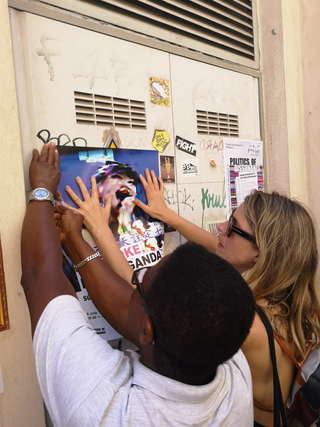
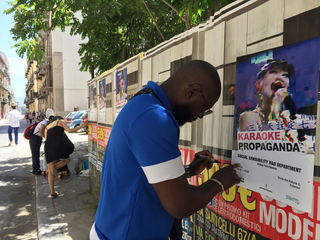
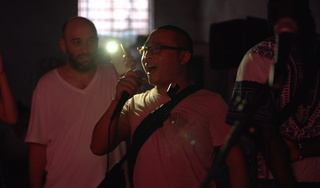
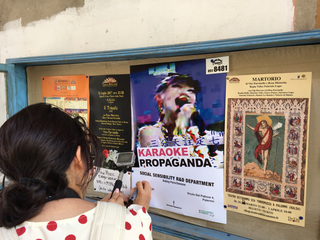
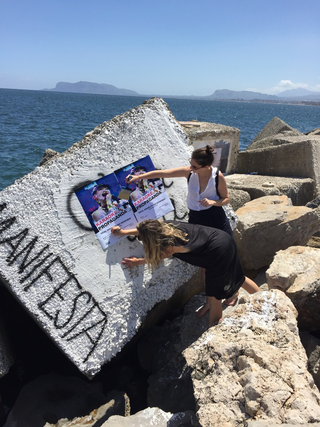
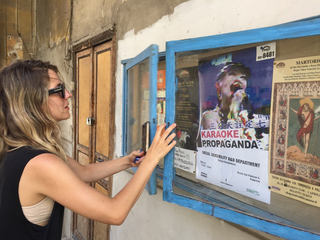
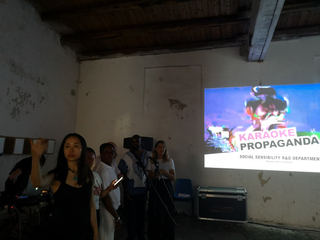
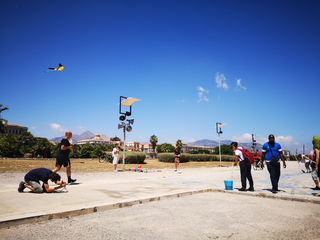
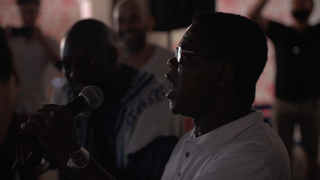
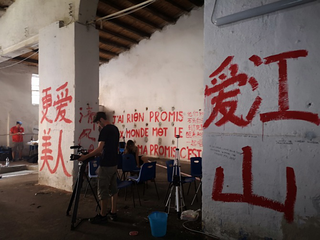
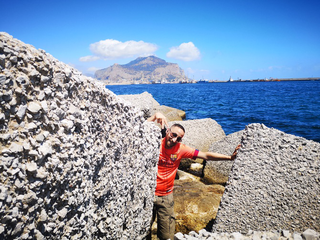
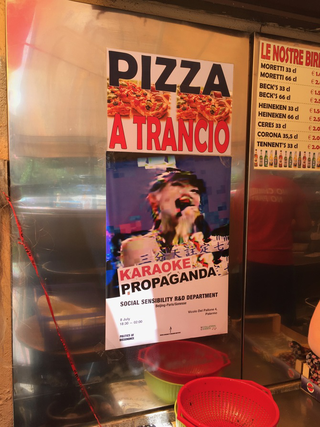
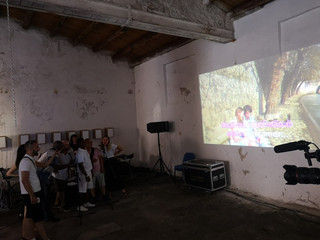
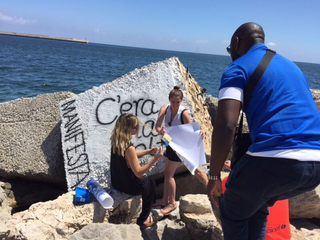
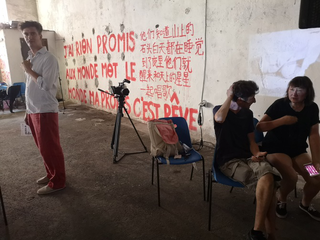
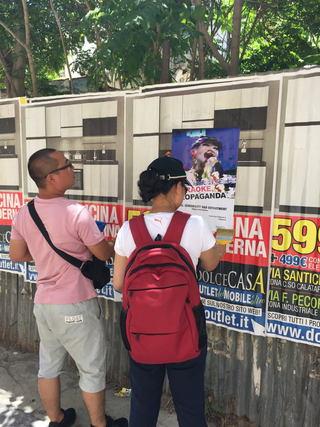
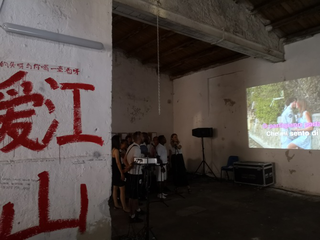
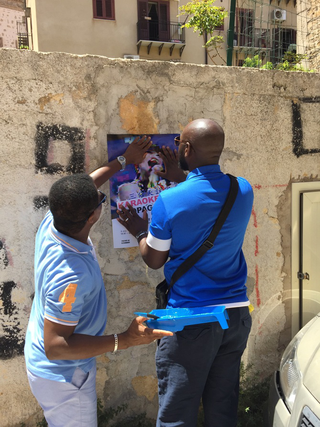
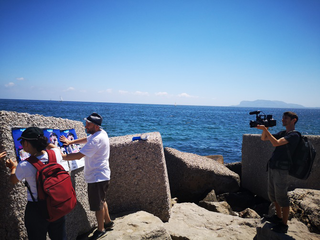
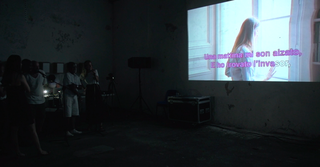
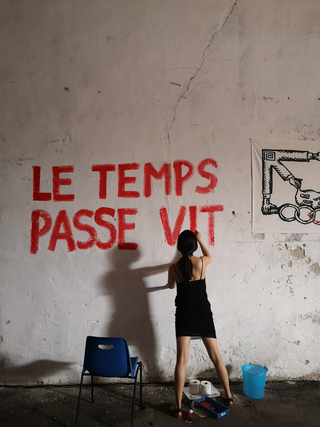
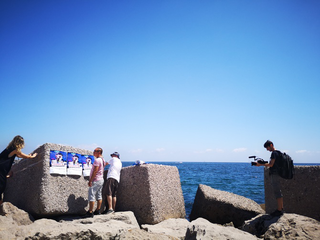
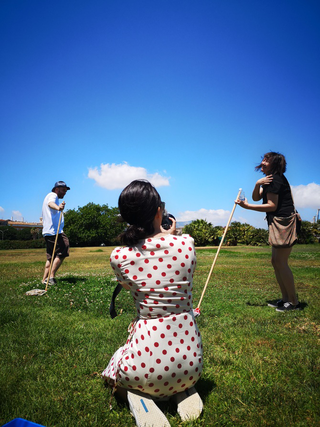
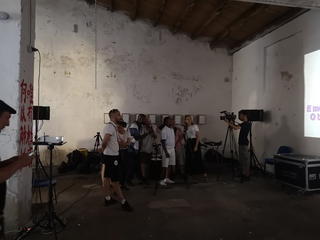
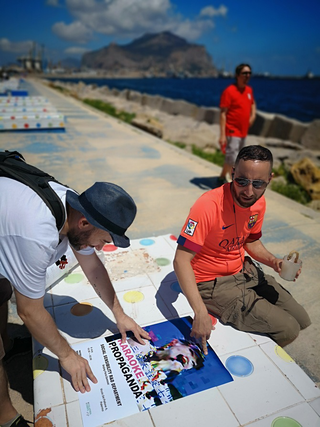
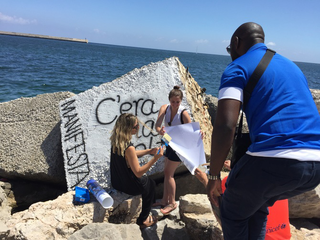
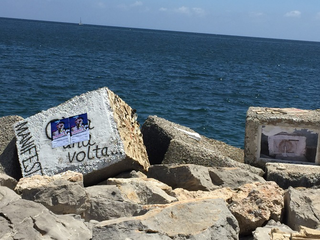
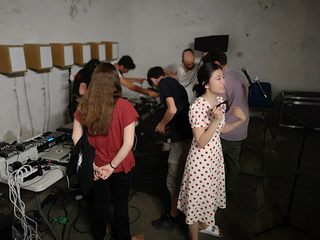
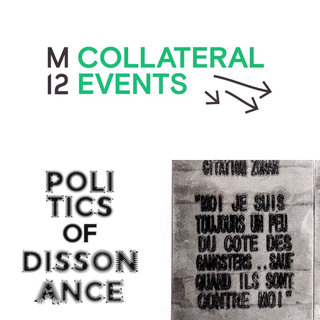
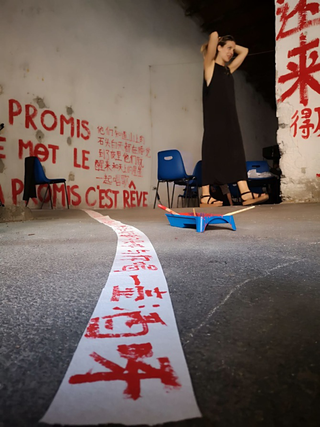
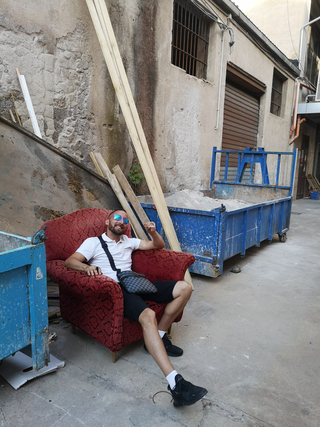
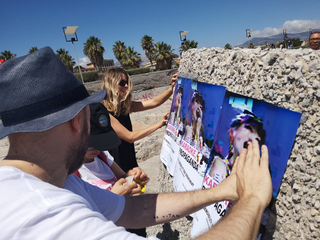
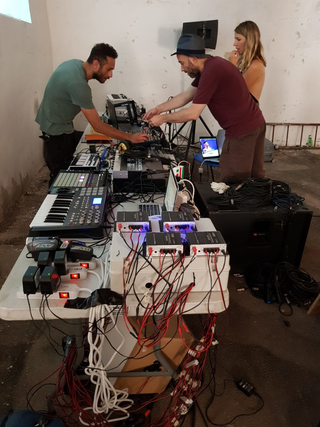
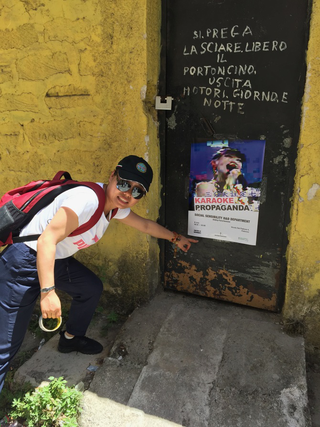
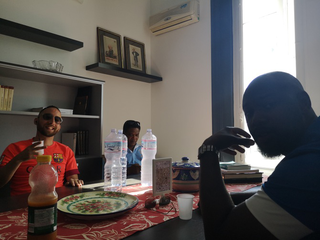
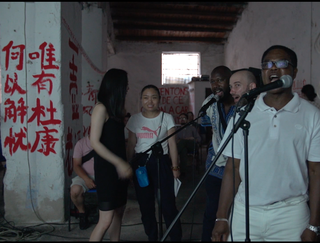
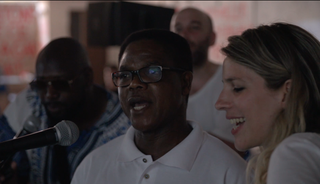
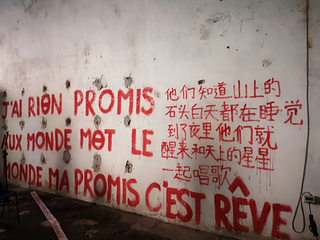
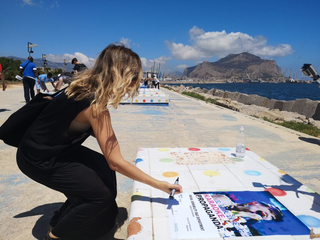
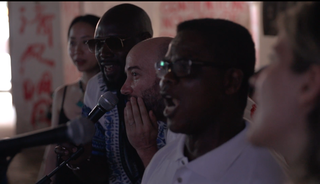
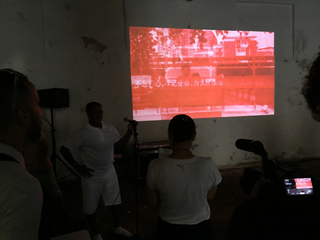
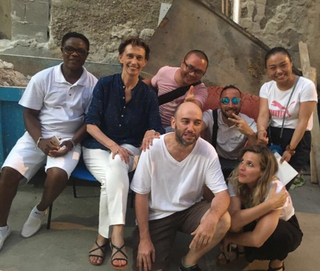
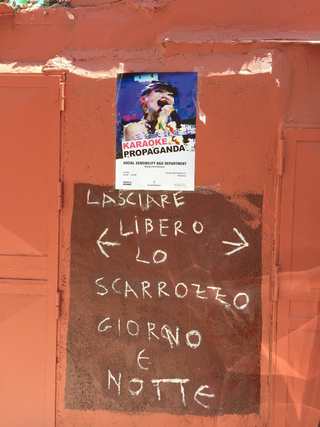
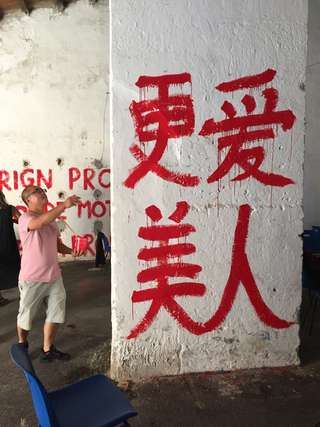
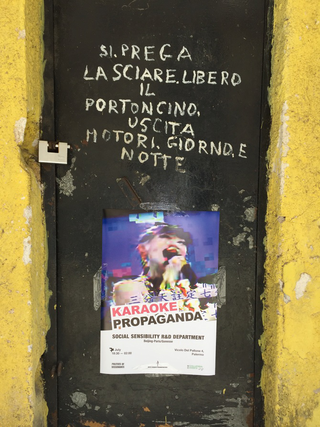
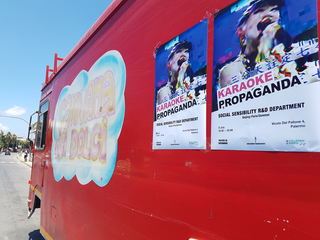
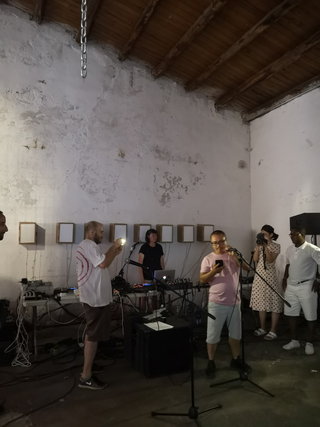
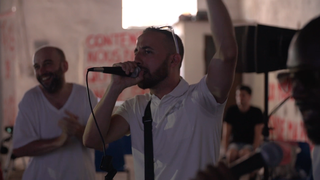
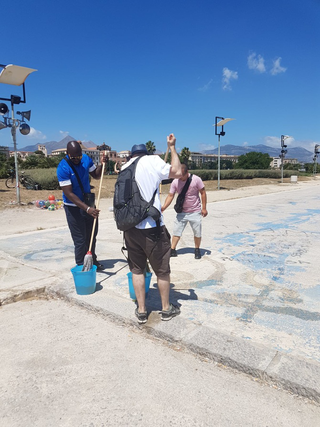
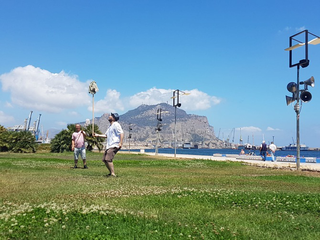
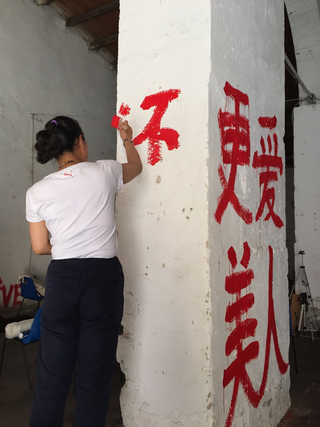
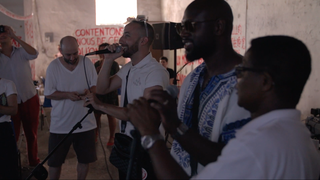
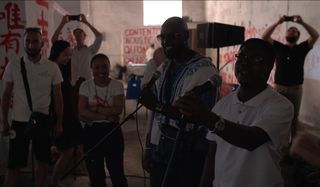
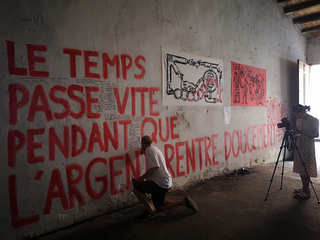
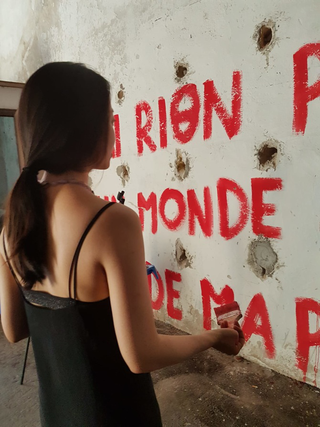
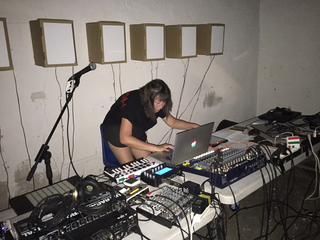
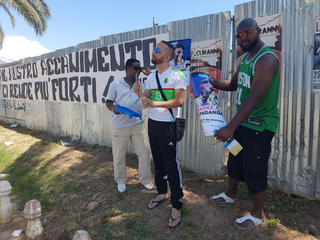
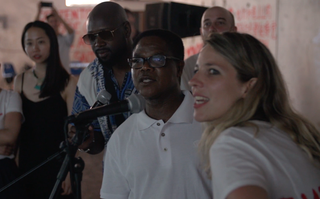
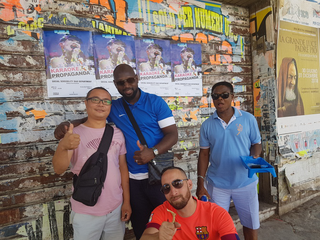
Social
Contatti
socialsensibilityrd@gmail.com